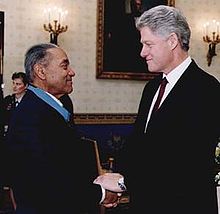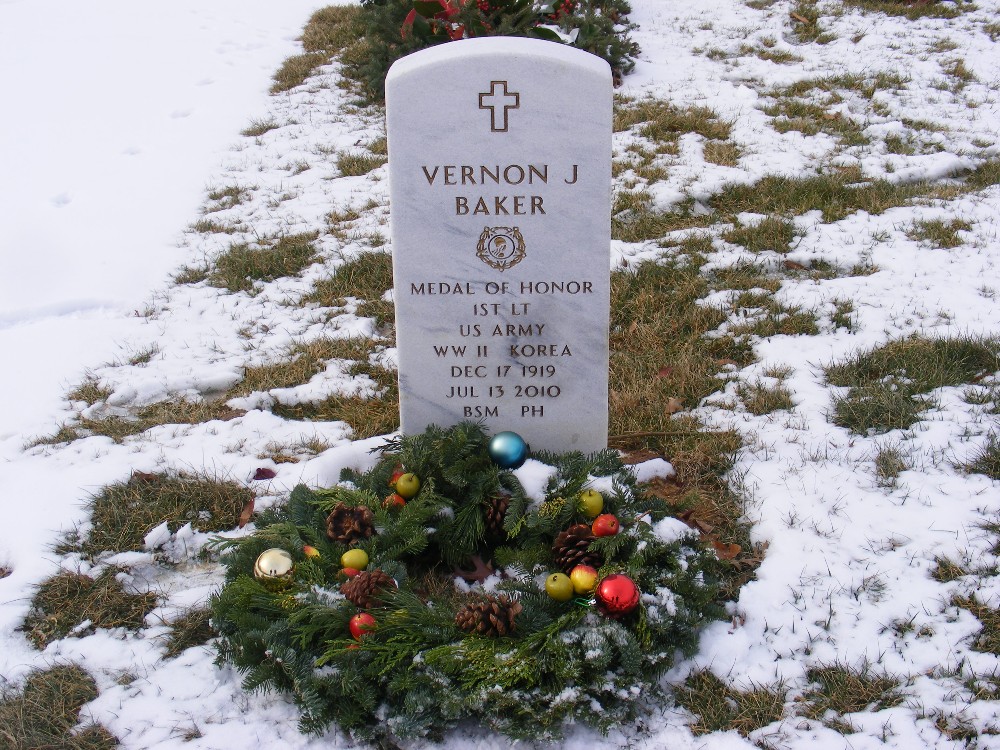16 July 2010:
Vernon Baker, a black U.S. soldier who belatedly received the Medal of Honor for his World War II battlefield valor after historians concluded he’d been wrongly denied the military’s top award because of his race, died at his home near St. Maries, Idaho. He was 90.
Baker died Tuesday of complications of brain cancer, Benewah County coroner and funeral home owner Ron Hodge said.
Then-President Bill Clinton presented the nation’s highest award for battlefield valor to Baker in 1997. He was one of just seven black soldiers to receive it and the only living recipient.
“The only thing that I can say to those who are not here with me is, ‘Thank you, fellas, well done,'” Baker told The Washington Post after the ceremony. “‘And I will always remember you.'”
In 1944, Second Lieutenant Baker was sent to Italy with a full platoon of 54 men. On April 5, he and his soldiers found themselves behind enemy lines near Viareggio, Italy. When concentrated enemy fire from several machine gun emplacements stopped his company’s advance, Baker crawled to one and destroyed it, killing three Germans. Continuing forward, he attacked an enemy observation post and killed two occupants.
With the aid of one of his men, Baker attacked two more machine gun nests, killing or wounding the four enemy soldiers occupying these positions. Then he covered the evacuation of his wounded soldiers by occupying an exposed position and drawing the enemy’s fire.
On the following night, Baker voluntarily led a battalion advance through enemy mine fields and heavy fire.
In all, Baker and his platoon killed 26 Germans and destroyed six machine gun nests, two observer posts and four dugouts.
He said later he felt the company commander, who said he was going to get reinforcements, had abandoned his group of men.
“It made me all the more determined to accomplish our mission,” he told the PBS series American Valor. “Because at that time the Army was segregated. It was thought that we were unable to fight.”
No black soldiers were awarded the Medal of Honor during World War II, although Baker did receive the Purple Heart, a Bronze Star and Distinguished Service Cross.
In 1993, U.S. Army officials contracted Shaw University in Raleigh, North Carolina, to study whether there was a racial disparity in the way Medal of Honor recipients were selected.
Historians did not find official evidence suggesting racial bias in the Army’s award policy. But the study’s authors say the political climate and common Army practices guaranteed no black soldier would ever receive the military’s top award.
The university researchers recommended 10 soldiers to receive it. From that list, Pentagon officials picked seven.
But there was one problem — the statutory limit for presentation had expired. Congress was required to pass legislation that allowed the president to award the Medals of Honor so many years after the action.
Vernon Baker was the only recipient still living; the other six soldiers received their awards posthumously, with their medals being presented to family members.
Baker was initially rebuffed when he tried to join the Army. Baker said in an interview with public television that a recruiter told him there was no quota for enlisting “you people.”
Reflecting on life in a segregated Army unit, he told The Washington Post, “I was an angry young man. We were all angry. But we had a job to do, and we did it.” He added that he “knew things would get better, and I’m glad to say that I’m here to see it.”
Baker returned to his northern Idaho home after the war. When he received a call telling him he was to receive a Medal of Honor, at first he was astonished. Then he was angry.
“It was something that I felt should have been done a long time ago,” he told Idaho public television. “If I was worthy of receiving the Medal of Honor in 1945, I should have received it then.”
Baker called his 1997 memoir Lasting Valor.
U.S. Rep. Walt Minnick said he met Vernon Baker in the 1990s when the soldier spoke at a College of Idaho event. Minnick said he’d been expecting a battle-hardened soldier but was instead struck by Baker’s gentle demeanor. Minnick said Baker’s valor on the battlefield in Italy was a rebuke of racist policies that dominated the U.S. military into the middle of the last century.
“His actions on the front line demonstrates better than words can describe why discrimination and segregation in the military was both unfair and absolutely inconsistent with an effective fighting force,” Minnick said. “He demonstrated a degree of courage few people have. He was prepared to give his life for his country — a country in which he was considered a second-class citizen.”
Baker was born in 1919 in Wyoming. Orphaned as a small child, he was raised by his grandparents in Cheyenne. He was working as a railroad porter when he decided to join the Army in mid-1941, a few months before Pearl Harbor.
In 2004, Baker underwent emergency surgery to remove a malignant brain tumor. Before he fell ill, he had failed to sign up for benefits from Veterans Affairs and Medicare, not realizing what the requirements were. Community members and politicians in Idaho pitched in to help him get aid for his unpaid medical bills.
Hodge said Baker continued to battle brain cancer over the next years, and he recently began receiving hospice care at his home. Baker was surrounded by his family when he died Tuesday evening.
Vernon Joseph Baker (December 17, 1919–July 13, 2010) was a United States Army officer who received the United States military’s highest decoration, the Medal of Honor, for his actions in World War II. He was awarded the medal for his actions on April 5–6, 1945 near Viareggio, Italy, when he and his platoon killed 26 enemy soldiers and destroyed six machine gun nests, two observer posts and four dugouts. He was the only living black World War II veteran of the seven belatedly awarded the medal of honor when it was bestowed upon him by President William Jefferson Clinton in 1997.
Baker was born on December 17, 1919, in Cheyenne, Wyoming, the youngest of three children. After his parents died in a car accident when he was four, he and his two sisters were raised by their grandparents. His grandfather Joseph S. Baker, a railroad worker in Cheyenne, taught him to hunt in order to feed the family and became “the most influential figure in Vernon’s life.” His relationship with his grandmother was much more strained, and he spent a few years at the Boys Town orphanage in Nebraska to be away from her.
Baker graduated from high school in his grandfather’s hometown of Clarinda, Iowa. He then worked as a railroad porter, a job he despised, until his grandfather’s death from cancer in 1939. A series of menial jobs followed until his enlistment in the United States Army in mid-1941. At his first attempt to enlist, in April 1941, he was turned away, the recruiter stating “We don’t have any quotas for you people.” He tried again weeks later with a different recruiter and was accepted; he requested to become a quartermaster but was instead assigned to the infantry.
Baker entered the Army on June 26, 1941, six months prior to the U.S. entry into World War II. He went through training at Camp Wolters, Texas, and after completing Officer Candidate School was commissioned as a second lieutenant on January 11, 1943.
In June 1944, Baker was sent to Italy with the all-black 92nd Infantry Division. He was wounded in the arm in October of that year, hospitalized near Pisa, and in December rejoined his unit in reserve along the Gothic Line. In early spring, 1945, his unit was pulled from the reserves and placed in active combat. On the morning of April 5, he participated in an attack on the German stronghold of Castle Aghinolfi. During the assault, Baker led his heavy weapons platoon through German defenses to within sight of the castle, personally destroying three machine gun nests, two observation posts, two bunkers, and a network of German telephone lines along the way. It was for these actions that he was later awarded the Medal of Honor.
After the end of the war, Baker remained in Europe with the Allied occupation forces until 1947. He later joined the Army Airborne forces and left the military in 1968 as a First Lieutenant.
Vernon Baker was awarded the Medal of Honor by President Bill Clinton on January 13, 1997. In 1993, a study commissioned by the United States Army described systematic racial discrimination in the criteria for awarding medals during World War II. At the time, no Medals of Honor had been awarded to black soldiers who served in World War II. After an exhaustive review of files, the study recommended that several black Distinguished Service Cross recipients have their awards upgraded to the Medal of Honor. On January 13, 1997, President Bill Clinton awarded the medal to seven African American World War II veterans; Baker was the only recipient still living at the time.
Baker’s official Medal of Honor citation reads:
“For extraordinary heroism in action on 5 and 6 April 1945, near Viareggio, Italy. Then Second Lieutenant Baker demonstrated outstanding courage and leadership in destroying enemy installations, personnel and equipment during his company’s attack against a strongly entrenched enemy in mountainous terrain. When his company was stopped by the concentration of fire from several machine gun emplacements, he crawled to one position and destroyed it, killing three Germans. Continuing forward, he attacked an enemy observation post and killed two occupants. With the aid of one of his men, Lieutenant Baker attacked two more machine gun nests, killing or wounding the four enemy soldiers occupying these positions. He then covered the evacuation of the wounded personnel of his company by occupying an exposed position and drawing the enemy’s fire. On the following night Lieutenant Baker voluntarily led a battalion advance through enemy mine fields and heavy fire toward the division objective. Second Lieutenant Baker’s fighting spirit and daring leadership were an inspiration to his men and exemplify the highest traditions of the Armed Forces.”
Baker’s first wife was Fern Brown and the couple had three children. After his wife’s death in 1986, he moved to a cabin in the Benewah Valley of northern Idaho. Baker was an avid hunter, and hunted elk in northern Idaho before and after moving to the area. In 1989, he met a German woman visiting the United States, Heidy Pawlick, whom he would later marry.
Baker died at his St. Maries, Idaho, home on July 13, 2010 after a long battle with cancer. He had been near-death due to brain cancer in 2004 but had recovered. Funeral arrangements at Arlington National Cemetery are pending.
MOUNT PLEASANT, South Carolina — The Congressional Medal of Honor Society announces that First Lieutenant Vernon Baker, Medal of Honor recipient, passed away Tuesday evening at his home in St. Maries, Idaho at age 90.
Then Second Lieutenant Baker was assigned to the segregated 370th Regiment of the 92nd Infantry Division–the first African-American unit to enter combat in World War II.
In the spring of 1945, Lieutenant Baker, the only African-American officer in his company, was in command of a weapons platoon ordered to launch an assault against a mountain stronghold occupied by the Germans. Moving ahead of the other platoons they encountered intense fire that inflicted heavy casualties. By afternoon, his captain ordered a retreat and Baker and his six remaining men covered their retreat, killing 26 enemy soldiers, destroying six machine gun nests, two observer posts and four dugouts. The next day, Baker volunteered to lead a battalion assault. Picking their way through minefields and heavy fire they finally secured the position at the top of the mountain.
Former President William J. Clinton presented First Lieuenant Baker with the Medal of Honor–the highest award given to those who acted with uncommon, selfless courage–on January 13, 1997 for his actions April 5-6, 1945 near Viareggio, Italy during World War II.
First Lieutenant Baker was one of seven African-American service members to receive the Medal of Honor for their heroic actions in WWII as a result of a review of the individual records of African-American service members in the early 1990’s. At the time, no African-Americans had been awarded the Medal of Honor despite their heroic exploits in WWII. Vernon Baker was the only one of the seven still alive when the Medal of Honor was awarded. His actions had previously earned him the Distinguished Service Cross.
First Lieuenant Baker was born in Cheyenne, WY on Dec. 17, 1919. He enlisted in the Army on June 26, 1941, six months prior to the U.S. entry into World War II. After completing Officer Candidate School, he was commissioned on January 11, 1943. He retired in 1968 as 1st Lieutenant after serving 27 years in the Army.
He is survived by his wife, Heidy. Funeral services are pending.
August 10, 2010:
ST. MARIES, Idaho – Strangers are stepping up to help the widow of a North Idaho veteran who received the Congressional Medal of Honor.
Vernon Baker died at his St. Maries home in July and will be buried at Arlington National Cemetery. He enlisted in the U.S. Army in 1941, served and was wounded in World War II. Vernon was 90-years-old.
But Baker’s wife of the last 17 years, Heidy Baker, can’t afford to attend the burial of her own husband’s ashes.
“I can keep it together more on the outside, but on the inside I’m just so sad and so empty,” Heidy told KREM 2 News Tuesday.
After a long bout with brain cancer, Heidy sensed Vernon was slipping away, but says he cracked jokes, remained positive and then spoke his final words.
“I was with him all day long on the bed and we talked until he left,” says Heidy.
Nine days ago, hundreds of people attended Vernon’s local memorial service in St. Maries, where Heidy was presented the American flag that draped her husband’s casket.
“That was a really, really bad moment,” says Heidy. “I think that was the hardest from the whole service.”
In September, the U.S. Army will bury Vernon’s ashes in Arlington National Cemetery, but the military is not covering any of the cost of the trip for Heidy. She’s financially down during hard times, and can’t afford the plane ticket to Washington, D.C. She wants to also take her grandson and daughter with her, for what she says will be and even more difficult ceremony than the last one.
Since that ceremony, the Post Falls National Guard is working to set up an account at all American West Bank locations to help pay for Heidy and her family’s travel. The account should be established and ready for donations by Wednesday.
13 August 2010:
PLUMMER, Idaho — It’s a remarkable story with a remarkable response from the community.
As first reported on Tuesday, the widow of St. Maries Medal of Honor recipient Vernon Baker said she could not afford to go to his burial service at Arlington National Cemetery.
But a lot has changed for Heidy Baker in the last 48 hours. Now, she can after an incredible amount of support and donations from across the country.
“It’s crazy, it’s absolutely crazy,” Heidy said at a cafe in Plummer, Thursday. “The phone is ringing and ringing and it’s fantastic.”
Vernon Baker is one of just seven African American soldiers to receive the Medal of Honor. He served in the U.S. Army during World War II, and spent most of his time overseas in Europe, where he was wounded once.
“I cannot even tell you. I have happy tears and I have sad tears. I cannot thank people enough,” says Heidy.
Donations came from all corners. Congressman Walt Minnick said he would donate his frequent flyer miles.
But the joy of the generosity and the trip is tempered by the sadness of losing a husband.
“I’m not looking forward to it,” says Heidy. “I know I need to do this. I think that’s the place where Vernon should be…but it will also be really hard.”
But it’s a pain she needs, and wants to feel. And it’s a trip she can’t believe she will get to make. One last trip with Vernon.
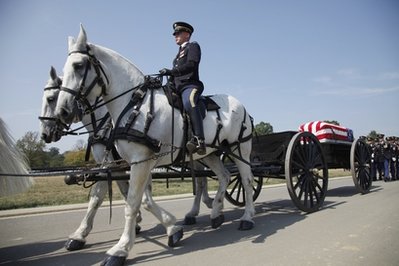
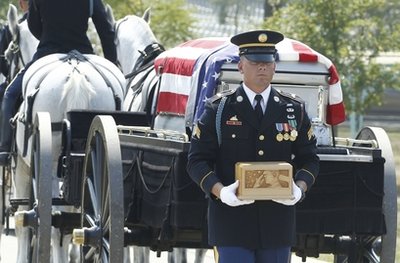
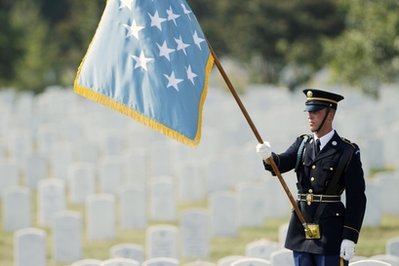
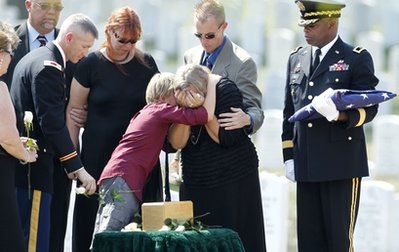
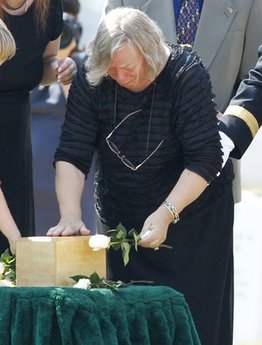
BAKER, VERNON J
- 1ST LT US ARMY
- WORLD WAR II, KOREA
- DATE OF BIRTH: 12/17/1919
- DATE OF DEATH: 07/13/2010
- BURIED AT: SECTION 59 SITE 4408
- ARLINGTON NATIONAL CEMETERY
Michael Robert Patterson was born in Arlington and is the son of a former officer of the US Army. So it was no wonder that sooner or later his interests drew him to American history and especially to American military history. Many of his articles can be found on renowned portals like the New York Times, Washingtonpost or Wikipedia.
Reviewed by: Michael Howard

